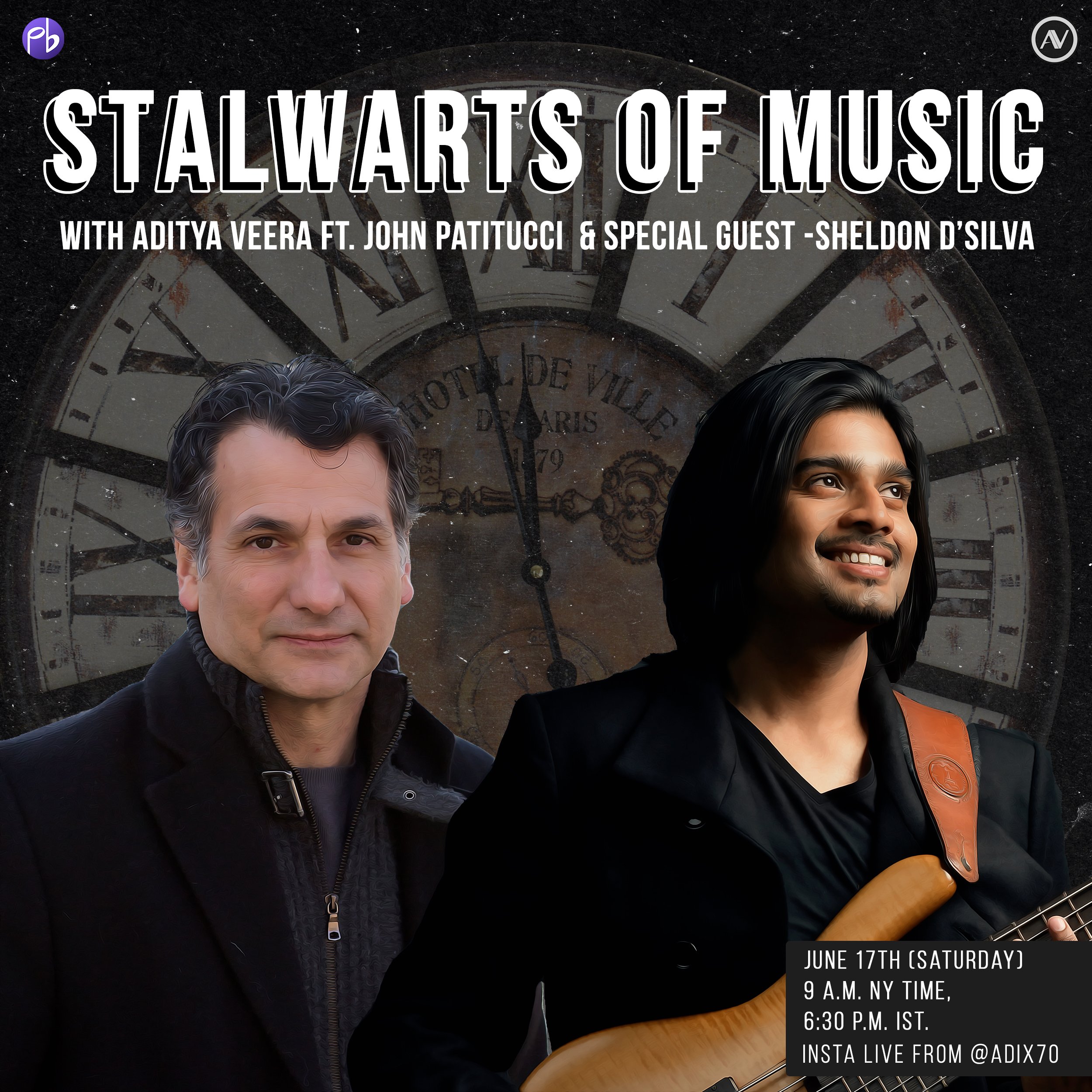Bridging Realms: Navigating the Heart of Bass with John Patitucci and Sheldon D'Silva
In this episode of Stalwarts Of Music with Aditya Veera Season 2, the spotlight shines on distinguished guests John Patitucci and Sheldon D'Silva.
John Patitucci, born in Brooklyn in 1959, embodies a multifaceted musical career that transcends genres, instruments, and continents. His musical journey commenced early, delving into the electric bass at age ten and gradually mastering the acoustic bass and piano. Graduating from San Francisco State University and Long Beach State University, John's versatility bridged diverse musical realms, from soul and rock to blues, jazz, and classical. Notable for his studio collaborations with iconic artists like B.B. King, Chick Corea, Wayne Shorter, and many others, he received accolades, including the prestigious National Academy of Recording Arts and Sciences MVP on Acoustic Bass in 1986. His global acclaim soared through solo performances and collaborations with jazz luminaries, earning him two Grammy Awards and numerous nominations. John's compositional prowess extended beyond jazz; he composed for orchestras, chamber ensembles, and diverse partnerships. His significant contributions include his tenure at educational institutions, mentoring aspiring musicians at The City College of New York, and Berklee College of Music’s Global Jazz Institute. Residing in New York with his family, John Patitucci's legacy echoes far beyond his recordings, defining him as a luminary of the global music community.
Sheldon D'Silva is a prodigious musician whose journey began when his father introduced him to the bass guitar at the tender age of 12. With unwavering support from his parents, Sheldon passionately dedicated himself to mastering the instrument, drawing inspiration from music maestros and absorbing knowledge from adept musicians. He believes the bass guitar serves as a vital bridge between rhythm and melody across diverse musical genres. Embracing mentorship from legendary figures like Louiz Banks, Sheldon co-founded Nexus at just 16, fostering innovative sounds and musical experimentation. Juggling studies in science and commercial art, he merged his learning into his musical endeavors. Inspired by renowned bassists like Jaco Pastorius, John Patitucci, and Sting, Sheldon aims to redefine the perception of bassists, advocating for their pivotal role in music. His eclectic journey includes performances alongside a myriad of global icons and diverse genres, from jazz and funk to rock and fusion. From sharing the stage with jazz legends George Duke and Al Jarreau to being part of renowned bands like INDUS CREED and Nexus, Sheldon has graced prestigious festivals like the Montréal Jazz Festival and the Java Jazz Festival, leaving an indelible mark in the global music sphere. His collaborations span Coke Studio Pakistan, Bollywood soundtracks, and a multitude of international albums, showcasing his versatility and expertise. An ambassador at the John F. Kennedy Center in Washington, D.C., Sheldon’s musical prowess and profound knowledge continue to propel him as an esteemed musician and an international endorsee for D’Addario and MuB Basses.
The episode opens with a discussion featuring John, who shares his recent endeavors—performing at Birdland in New York City, scoring a film during the pandemic, and forthcoming projects. His multifaceted musical journey, encompassing recording, composing, and teaching at Berklee College of Music, becomes the focal point of the conversation.
Aditya deftly transitions into exploring John's early musical influences, emphasizing the pivotal role of his grandfather and the introduction to the bass guitar. John vividly recalls moments of listening to artists like Stevie Wonder and The Beatles on the radio and the profound impact of discovering jazz records, particularly those by Art Blakey and The Jazz Messengers with Wayne Shorter.
The dialogue then delves into John's reflections on Wayne Shorter's music and its influence on improvisation, freedom, and self-expression. His eloquent descriptions emphasize the emotional connection and storytelling within jazz music, an element that shaped his musical foundation.
John shares insights into his approach to preserving traditions while infusing his unique voice into the music. His journey through classical bass studies and the decision to pursue a diverse musical career are central points, leading him to perform on global stages and collaborate with jazz luminaries.
A spiritual angle emerges in the conversation as John discusses his upbringing in the Catholic Church, his inquiries into Christianity, and how his spiritual journey intertwines with his musical growth. He expresses gratitude for encounters with African-American cultural music, which shapes his understanding of rhythm and musical expression.
The interview progresses, touching on John's discipline, humility, and the perpetual process of learning and evolving as a musician. His reflections on imposter syndrome and his unwavering passion for music resonate with authenticity.
Discussions about the Chick Corea Elektric Band unveil the camaraderie that shaped John Patitucci's musical trajectory. Anecdotes from the band's early days, intense rehearsals, and the evolution of their performances underscore the transformative impact of such experiences on an artist's development.
John's insights on the significance of rhythm, sound, and conveying emotions irrespective of the number of notes played add depth to the conversation. He dispels misconceptions about technique, emphasizing the broader aspects encompassing coordination, sound, and transmitting one's spirit through the instrument.
The interview shifts to discussing a collaboration with Dan Costa on the album Beams 2023, revealing the musical roots and contemporary approaches embodied in the project. John's humility shines through as he discusses his authentic connection to the music and acknowledges the impact of collaborations on personal and professional levels.
An unexpected turn in the interview arises as the possibility of visiting India is suggested. John shares his experience collaborating with Zakir Hussain, expressing excitement at the prospect. This conversation hints at the global reach and cross-cultural influences embedded in John’s musical journey.
The conversation further unravels layers of John Patitucci's musical odyssey with a surprise appearance by Sheldon D’Silva, who is deeply influenced by John's work. Sheldon expresses gratitude and admiration, underscoring the significant impact John had on his musical approach. Personal experiences and the challenges of navigating the music scene in India are shared.
Sheldon reminisces about discovering John's music on the album Inside Out with Chick Corea, a discovery that led him to embrace the six-string bass. He attributes his evolution from a bass player to a musician to John's profound influence. The dialogue highlights the universal language of music that bridges cultural divides, inspiring musicians across continents.
As Sheldon shares his journey, the conversation explores the complexities of maintaining dual proficiency in both upright and electric bass. John reflects on his early attempts to balance the two instruments, acknowledging the challenges and the necessity of mastering both. The discussion delves into the distinct characteristics of each instrument and the skill sets required for mastery.
A poignant moment arrives as Sheldon emphasizes the significance of John's approach, describing it as a display of major musicality. John acknowledges the influence of bass legends like Stanley Clarke and Anthony Jackson, discussing the challenges of pursuing both acoustic and electric bass.
The conversation extends to John sharing anecdotes of influential figures in his life, such as Abraham Laboriel and Alex Acuña, who contributed to his comprehensive understanding of music. John's experiences in the Los Angeles studio scene during the late '70s and early '80s highlight the importance of adopting a composer's mindset and infusing each tune with a sense of responsibility.
Diverse musical influences, from Larry Graham's innovative style to the orchestration choices in Chick Corea's music, are explored. The cross-cultural exchange between musicians from India and the West highlights the universality of music.
Sheldon expresses gratitude for John's impact on his musical journey. John humbly accepts the acknowledgment and shares insights into his musical evolution, emphasizing orchestration and adaptability to different musical contexts. Sheldon praises one of John's albums, labeling it as a favorite. John credits Chick Corea for the existence of the album, stressing the importance of collaboration in its creation.
The conversation seamlessly shifts to Sheldon's evolving journey, discussing the challenge of balancing roles as an acoustic and electric bassist. John interjects, offering insights into the complexities of Chick Corea's music, particularly the intricate arrangements and the need for a diverse musical vocabulary.
Sheldon navigates the discussion toward music education in India, expressing concerns about the absence of conservatories and comprehensive music schools. He draws parallels between his learning experiences through records and the prevalent trend of quick-fix online tutorials. John emphasizes the importance of transcription and ear training in a global musical context, applauding initiatives like the Global Jazz Institute in Berkeley.
The dialogue evolves, exploring the nuances of bass playing in modern contexts. Sheldon observes a uniformity in the sound of contemporary bass players, contrasting it with the diverse and unique sounds of pioneers like Anthony Jackson, Gary Willis, Victor Wooten, and Stanley Clarke. John attributes this trend to the ease of imitating certain aspects without delving into the deeper intricacies of sound creation.
The conversation culminates in a poignant discussion on how life experiences shape musical expression. John eloquently emphasizes the necessity of embracing life's ups and downs to infuse depth into one's music. Inspired by this philosophy, Sheldon invites John to review a piece titled When Times Change, dedicated to his late father.
As the interview concludes, an atmosphere of warmth and camaraderie permeates. Aditya expresses hopes for future collaborations between the bassists, with John eagerly anticipating a visit to India. The interview, touching on the technical and spiritual facets of music, stands as a testament to music's power in transcending cultural boundaries and forging profound connections between individuals.

